tsa
Latest

TSA begins testing fingerprint check-ins at two US airports
It's never a nice experience to stand in line at the airport for hours just to get a pat down when you get to the end. Hopefully, TSA's new biometric fingerprint tech could make air travel a more pleasant experience for most people. Starting this week, the Transportation Security Administration's fingerprint sensors will go through proof-of-concept testing at Hartsfield–Jackson Atlanta International Airport and at Denver International Airport. The test will last for four weeks, and you can try it out for yourself if you registered your fingerprint as part of TSA's PreCheck program.
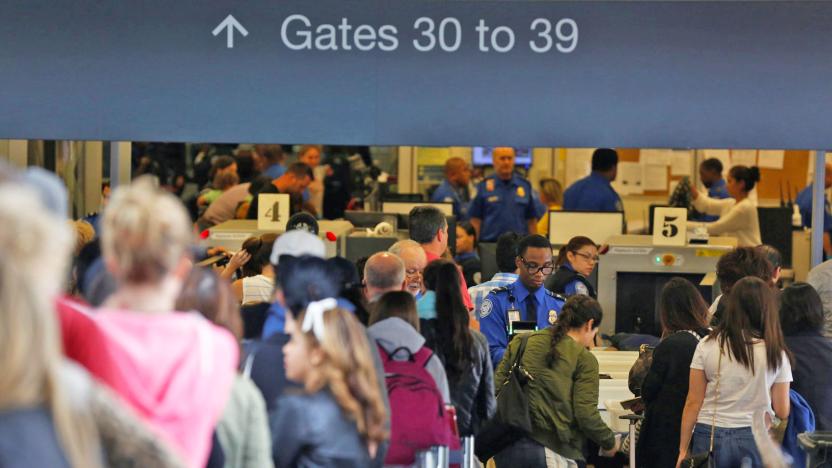
TSA may ask you to unpack tablets and cluttered carry-on bags
While it looks like the airline industry has successfully held off the US Department of Homeland Security's proposed laptop ban for now, the government will soon be giving carry-on bags an extra thorough inspection at airports around the country anyway. Starting after this summer's travel rush, the TSA is expected to implement a range of new policies that will likely lead to a lot more unpacking and re-packing at airport security checkpoints. Suddenly those automatic security screenings can't come soon enough.
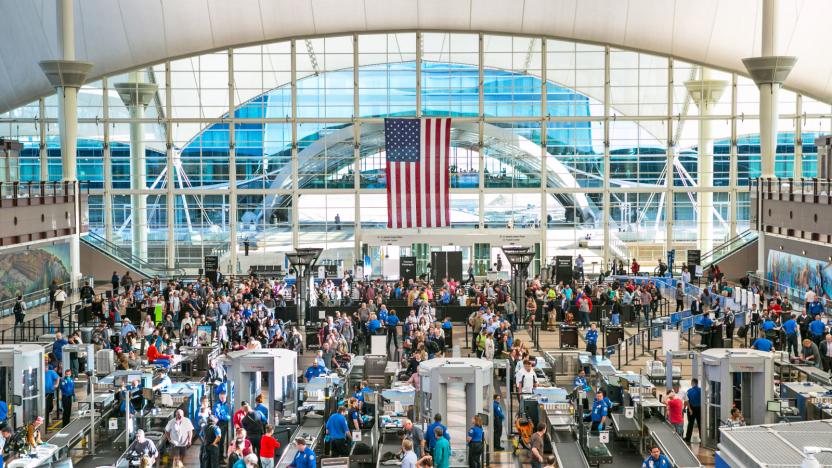
Airports may use face recognition to screen US citizens (update: more info)
Right now, the US is trotting out an airport security plan revolving around facial recognition. It's supposed to automatically register visitors to the US when they leave, and signal when they come back. However, Customs and Border Protection now wants to expand the effort to include virtually every situation where you normally need an ID -- and that could include scanning US citizens. The agency's John Wagner has floated the possibility that face recognition could also be used to scan all arrivals, TSA checkpoints and lounge access, including citizens. CBP hasn't committed to a firm plan, but it tells The Verge it wants to "open the dialogue" to people outside its walls.
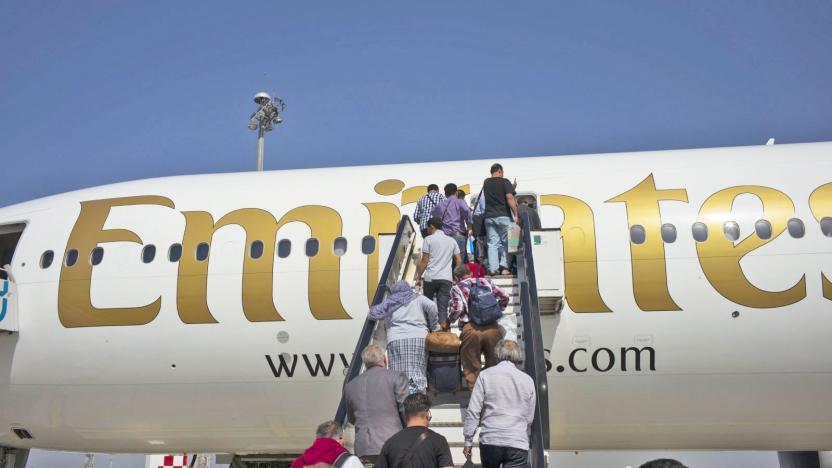
Emirates will hand out Surface tablets on flights from Dubai
In mid-March, the US hastily instituted an indefinite ban on electronic devices larger than a cellphone from being carried on to the flights of nine Middle Eastern airlines. Reportedly, it was to prevent terrorists from sneaking an explosive-laden fake iPad into the cabin, though few details on the specific threat have emerged in recent weeks. To compensate travellers for the hassle of spending hours on a flight without their trusty laptops, Emirates has begun offering complimentary Microsoft Surfaces for the durations of affected flights.

TSA debunks its own airport behavior screening
If you've ever suspected that the TSA's airport behavior screening (where it looks for visual signs of lying or stress) was just another example of ineffective security theater, you now have some science to back up your hunches. Thanks to a lawsuit, the ACLU has obtained TSA files showing that the organization has pushed and even expanded its "behavior detection" program despite a lack of supporting evidence. While the TSA maintains that it can detect signs of shady activity through fidgeting, shifty eyes and other visual cues, studies in its files suggest just the opposite -- you'd have just as much success by choosing at random. And those are in controlled conditions, not a busy airport where anxiety and stress are par for the course.

Anyone can now print out all TSA master keys
Shortly after The Washington Post inadvertently published a photo of seven TSA master keys, a group of security experts were able to copy their designs and release their 3D models online. Now, these same experts have deciphered the secrets of the eighth and last master key the agency uses even without a photo to guide them. The first seven keys are manufactured by a company called Travel Sentry, while this one is by a separate manufacturer named Safe Skies. Since the hackers didn't have a photo of the last key, they bought as many Safe Skies locks as possible, took them apart and examined their innards. Anyone with access to a 3D printer can now reproduce all eight keys.
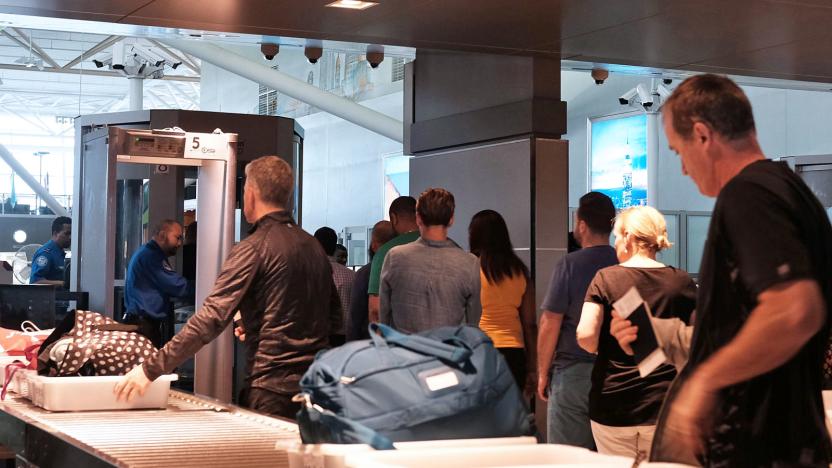
American Airlines to test automatic security screening this fall
It's bad enough that US airports engage in security theater that seldom makes you safer. However, it's made that much worse by the delays -- having to wait for agents to X-ray your bags is frustrating when you're desperate to get to your gate. American Airlines and the Transportation Security Administration aren't deaf to your complaints, though. They're partnering on a trial this fall for automatic screening technology that should be both more effective and save about 30 percent of your precious time in line. Among the improvements are automatic conveyor belts, a way of isolating risky bags without disrupting the queue, RIFD tags for bins and cameras that link outside photos of a bag to its X-ray.
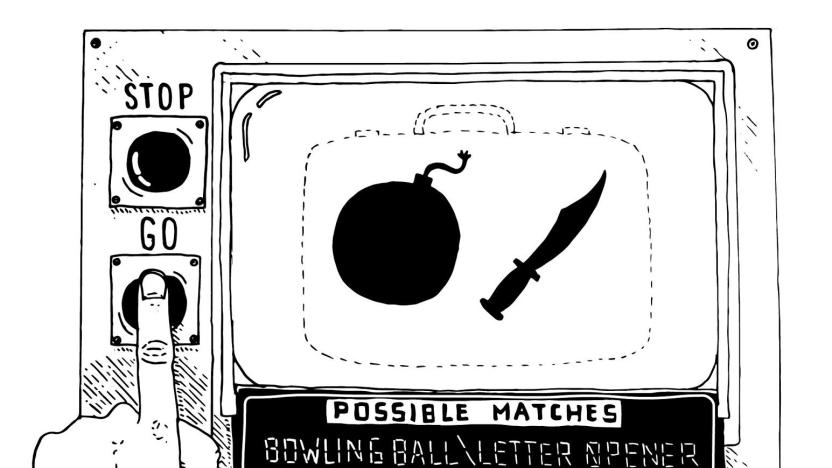
The TSA is failing spectacularly at cybersecurity
Five years of Department of Homeland Security audits have revealed, to the surprise of few and the dismay of all, that the TSA is as great at cybersecurity as it is at customer service. The final report from the DHS Office of Inspector General details serious persistent problems with TSA staff's handling of IT security protocols. These issues include servers running software with known vulnerabilities, no incident report process in place, and zero physical security protecting critical IT systems from unauthorized access. What we're talking about here are the very basics of IT security, and the TSA has been failing at these quite spectacularly for some time.
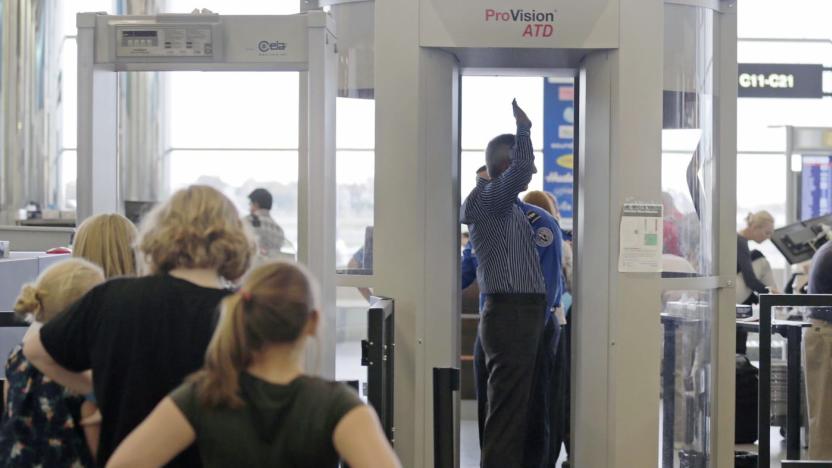
Full-body TSA scans are mandatory for 'some passengers'
The Transportation Security Administration was under pressure to establish rules regarding airport body scanners, and well, the Department of Homeland Security's weighed in. Now the Advanced Imaging Technologies (AIT) using Automatic Target Recognition (ATR) will be mandatory in certain cases. Slashgear notes that prior to this the scanners were opt-in, and one could go through a contactless, non-imaging scan instead. That option will exist, but security agents can insist on mandatory screening "for some passengers." The argument the DHS gives (PDF) is that these scanners are more capable of detecting prohibited, non-metallic items that could be hidden under a few layers of clothing than a metal detector wand would be.
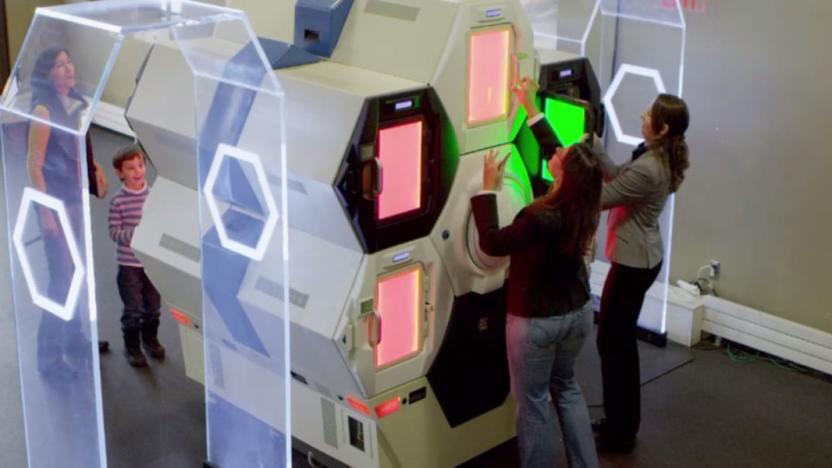
This new security checkpoint could keep the TSA out of your bags
At the top of the list of "things that piss off air travelers" is, far and away, the hassle of having a bunch of TSA clownholes rummage through their bags at security checkpoints. However, a new bag-scanning system from Qylur could speed that process up significantly.

Court orders TSA to set rules for full-body airport scanners
Did you think the Transport Security Administration was reckless when it started installing full-body scanners at airports several years ago? So did the Competitive Enterprise Institute -- and the libertarian think tank just won a legal victory that could make the TSA clean up its act. In the wake of a lawsuit, the US Court of Appeals has ordered the TSA to finalize a rulemaking schedule for the scanners by November 22nd. The agency was supposed to have established rules for the scanners before it even installed them, but it has dragged its heels ever since -- even a 2011 order to "promptly" establish rules didn't do much. With this ruling, the TSA doesn't have much of a choice.

3D-printable files of TSA master baggage keys are out for download
If you never trusted your luggage lock much to begin with, then you're going to warily look at it in suspicion from now on. Some security enthusiasts took that photo of TSA's master baggage keys that The Washington Post published and turned them into 3D-printable CAD files -- in fact, they've recently uploaded them on GitHub, making them freely available to everyone. The person who released the files told Wired that while he tried to be as accurate as he could, he didn't exactly expect the keys to work. Thing is, at least one of them did work: Bernard Bolduc, who describes himself as a "Unix wizard and security geek" on Twitter printed out a key and tried it on his TSA-approved lock.

TSA inadvertently shows the dangers of master baggage keys
Security researchers have long warned of the dangers of using master-keyed locks -- if thieves get their hands on just one key, they compromise all of the compatible locks at the same time. And unfortunately, the US' Transportation Security Administration is learning this lesson the hard way. It briefly let the Washington Post show a photo (we've blurred the details) of the master baggage keys it uses for approved locks, giving crooks a crude guide to making duplicates. And you can't just switch to a non-standard lock to get around this, since TSA agents will rip it off if they catch it during an inspection.

Feds ask airlines to look for theoretical WiFi hacks
The FBI and TSA have begun telling airlines to watch out for passengers attempting to access their planes' internal navigation networks, despite lacking evidence that anybody's ever actually tried to do so. The Feds are warning aircrews to look for people attempting to access these networks via the public-facing WiFi, through the In-Flight Entertainment systems or by physically connecting to the network ports that everybody now knows are located under their seats.

The key to unlocking this smart luggage lock is NFC
eGeeTouch seems to have solved a travel problem we weren't even aware we had. Rather than having to fumble with a dial code or a key that's been TSA approved, the company's keyless smart lock uses NFC and a battery that should perform for 30,000 cycles between changes. Push the unlock button to activate, swipe the included NFC badge or your phone over the lock, and then slide the catch to unlock the lock. Battery die mid-trip? No worries: You can still use the device's physical key or a USB port on the side that will power it while you activate the lock to open it. While the eGeeTouch's developers don't have any immediate plans to sell the lock as a standalone device, they're already in talks with luggage vendors to have this on the market by the second quarter of the year.

Security flaw lets Delta passengers access strangers' boarding passes
If you've been dreaming about tanning on Miami Beach versus visiting your family in Minneapolis this holiday, a security flaw involving Delta Airlines' electronic boarding pass system might just make that a reality. Dani Grant, a product intern at BuzzFeed and founder of Hackers of NY, realized she could share the URL to her boarding pass for anyone to download. Then, by changing a digit in the URL, someone else's boarding pass (even on another airline) popped right up.

Sneaking weapons past body scanners is easier than you think
For a while now, folks have been discussing how Rapiscan backscatter X-ray machines used at various security checks can be easily duped. Since metal shows up as black shapes on the scan, it's quite easy to hide something on one's side, or attached to the inside of clothing, blending in to the captured image's background. A cooperative effort amongst researchers from the University of California at San Diego, University of Michigan and John Hopkins has been looking into possible tricks of their own. The group discovered that teflon tape could be used to conceal a weapon on the spine, malware is capable of faking image captures and wrapping items (like simulated explosives) around the body could make them read as flesh on the scans. A bit of good news is the Rapiscan Secure 1000 model tested by the team was swapped out last year by the TSA in favor of millimeter-wave scanners that provide a less detailed image to security personnel. However, the systems remain in use for government buildings around the US. [Photo credit: Michael Fein/Bloomberg via Getty Images]

TSA to require electronics on international flights to be charged
If you're an American who plans to travel overseas, charge your iPhone and other electronic devices before you hit the Airport. The TSA has made some changes that could allow them to confiscate a device that can't be turned on. A recent press release vaguely detailed the new rules: Last week, Secretary of Homeland Security Jeh Johnson directed TSA to implement enhanced security measures at certain overseas airports with direct flights to the United States. As the traveling public knows, all electronic devices are screened by security officers. During the security examination, officers may also ask that owners power up some devices, including cell phones. Powerless devices will not be permitted onboard the aircraft. The traveler may also undergo additional screening. TSA will continue to adjust security measures to ensure that travelers are guaranteed the highest levels of aviation security conducted as conveniently as possible. As of right now there is no official list of airports where these rules will be enforced, so as a matter of personal security make sure you fully charge all devices before you reach the airport. You could save yourself the trouble of losing your device at worst, or getting an extra set of pat downs at best.

The TSA won't let you board some flights unless your devices turn on
You know how airport security will occasionally ask you to turn on a phone or laptop to prove that it isn't hiding explosives? Well, that's no longer just a rare inconvenience -- if you take certain flights, it's mandatory. The TSA now requires that you power on your gadgets when flying to the US from "certain overseas airports." If you have a dead battery, you're out of luck. You'll likely have to leave that hardware behind, and you might go through "additional screening" at the same time.

Everybody is flying, and everybody is crabby
Ben Huh is the founder and Chief Executive Officer of Cheezburger. He will be speaking at Expand NYC this November. Unidentified internet humor company founder planking during a flight. Plenty of people travel more miles than I do, but in 2012, I spent 171 days on the road. 2013 so far? 120 days. When I started Cheezburger, I didn't expect to travel this much, but my role has increasingly become chief evangelist, recruiter and promoter. Technology's impact on travel can be felt every step of the way, starting with weight-saving undergarments to the constellation of GPS satellites we take for granted watching over us. Everyone is used to complaining about air travel: Food is terrible (if there is any); the TSA is getting worse; seats feel smaller; we've suffered a string of computer-system-generated delays; horrific crash photos make the rounds on social media like wildfire; and airlines are charging fees, fees, everywhere. Having traveled intensively pre- and post-9/11, the air-travel experience has actually gotten much better. Yet we live by the Louis C.K. Rule: Everything's amazing, and nobody is happy. Let me count the ways from front door to hotel door.








